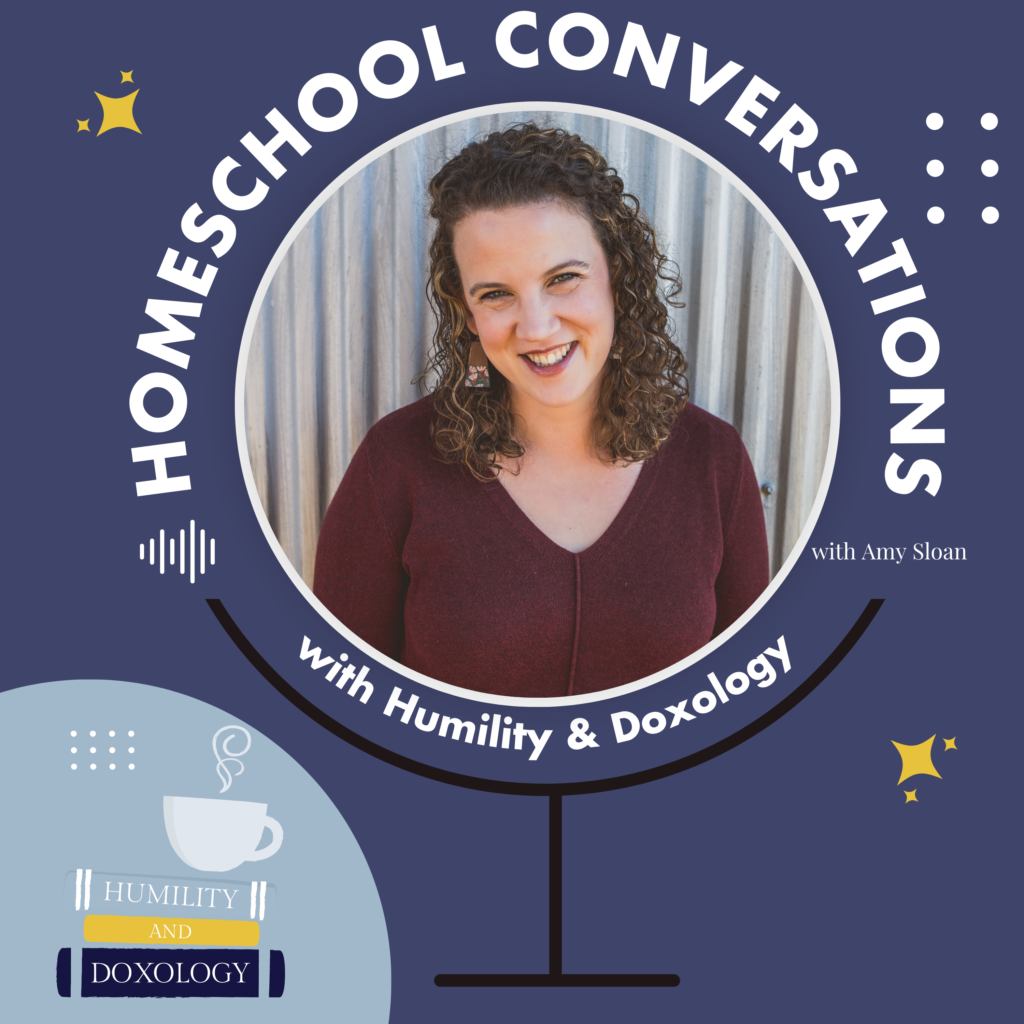Welcome back to another season of Homeschool Conversations with Humility and Doxology! I’m Amy Sloan, a second-generation homeschooling mom of five including 2 graduates, and I’m so excited to be back in your earbuds for Season 12. Today’s episode is a special one: a listener Q&A to kick off the new school year!
We’ll start with a little family update and then jump into your heartfelt questions about everything from “am I doing enough?” to college planning for homeschoolers. Let’s dive in!

{This post contains paid links. Please see disclaimer.}
Quick Family Update: Life in the Sloan Household
Our homeschool family continues to grow and change, and I wanted to share a quick update about where we are this fall:
- Isaac is more than 700 days into leukemia treatment and started 5th grade this year. Lord willing, he’ll ring the bell in January 2026!
- Grace is now the tallest Sloan lady and entering 8th grade (with mostly high school-level work!). She’s still podcasting and writing poetry!
- Sophia got her driver’s permit and is rising to the challenge of 10th grade.
- Emma just started college a few hours away. She graduated homeschool with her associate’s degree in hand.
- Joshua is in year three of his electrical engineering degree and recently returned from an internship out of town.

Question 1: “How Can I Know I’m Doing Enough?”
From Annie: “How can I really know I’m doing enough in our homeschool?”
Oh, Annie—what a question. I hear this from so many moms! We long for peace, not just platitudes. So how do we know we’re truly doing enough?
Gospel First
Our worth isn’t based on perfect checklists. Jesus is faithful…even when we are weak. We labor from a place of rest, not anxiety.
Practical Strategies
- Set Big Picture Goals: Focus on growth over grade levels. What’s your goal for each child this season?
- Regular Check-ins: Ask yourself, “Are we doing homeschool most days? Are we making progress toward our goals?”
- Use Narration and Conversation: You’ll gain insight by asking simple things like, “What was the most interesting thing you learned today?”
- Track Progress: Keep a simple notebook or digital journal of milestones and observations.
- Make a Portfolio: Include book lists, writing samples, math achievements, photos of experiments…anything that shows growth!
- Talk With Your Kids: Ask them what feels too hard or too easy. Their input is valuable!
And don’t forget to pray for wisdom and discernment. It can be hard sometimes to know when tears are an attitude issue…or a sign we’re pushing too hard,
God isn’t calling us to perfection. He’s calling us to faithful stewardship. I promise: you’re probably doing more than you think.
Question 2: “What If I Can’t Do It All?”
From Sandra: “How can I get it all done as a Charlotte Mason + classical homeschool mom with lots of young kids close in age?”
Been there. Still there some days! You’re not alone, Sandra.
Let Go of the Guilt
We’re finite. We will not do all the good things…and that’s okay. I still haven’t nailed down picture study or folk songs regularly, despite my best intentions. And yet, my kids are thriving.
Tips to Manage the Overwhelm
- Start Small: You don’t need a perfect plan to start. Just start.
- Use Morning Time: Loop subjects. Keep it short and meaningful. It adds up!
- Do Things Together: With kids close in age, combine subjects when possible.
- Embrace Atmosphere Over Checklists: Charlotte Mason said education is an atmosphere, a discipline, and a life. Set an example of wonder and entusiasm for learning.
Even without the “extras,” you’re shaping souls and building a beautiful education.
Question 3: “What If One Child Struggles More Than Their Sibling?”
From Eve: “My younger daughter struggles with reading, while her big sister was reading chapter books at age four. How can I help her feel confident?”
Oh yes. We’ve had readers start at age 3… and at age 8. You’re not alone, Eve.
Tips for Supporting a Struggling Learner
- Celebrate Effort Over Performance: “You persevered!” means more than “You read that perfectly.”
- Share Your Struggles: Tell her stories of times you had to work hard too.
- Affirm Her Strengths: Whether it’s art, storytelling, or kindness, help her shine outside of reading.
- Choose Confidence-Boosting Books: Let her reread favorites and use high-interest, low-reading-level options.
- Avoid Comparisons: Even accidental ones. Keep the focus on her uniqueness.
- Rest in God’s Timing: Progress will come. Your love and support are already a gift.
Sibling comparison is normal…but so is unique growth.
Question 4: “How Has Being a Second-Generation Homeschooler Shaped You?”
From Lindsay: “How has your homeschool background influenced your current homeschooling choices?”
Love this question!
Being homeschooled myself shaped me deeply. It gave me a love of learning and freedom to think outside the box. My parents weren’t perfect, but God was faithful…and that gave me a foundation of confidence outside of myself.
What Being a Second-Gen Homeschooler Has Taught Me
- I learned to focus on the why, not just the how.
- I don’t see homeschool as a vending machine; there’s no magic formula.
- I’m not afraid to do things differently. Homeschooling should fit the family, not the other way around.
I’ve learned that faithfulness in the small things is powerful. I’m thankful for that legacy.
Question 5: “Do You Need an Accredited Diploma for College Scholarships?”
From Andrea: “Do we need to use an accredited online program to get scholarships for college?”
Great question. Short answer: no, you do not need accreditation.
What’s Worked for Us
- Both of our college-bound teens got into the schools they applied to (state schools, private school, and a competitive program) using our parent-issued homeschool diploma.
- Everyone going for merit-based scholarships has an impressive transcript and test score. Look for ways to be unique instead of doing just the same thing as everyone else. You can also find outside-the-box funding (like essay contests and job-based awards).
- We focused on dual enrollment, strong transcripts, and being unique…standing out in the crowd of “perfect” applicants.
- Our kids worked during high school and contributed to their college funds.
- We prioritize no college debt and realistic financial expectations.
Resources I Recommend
- Fearless Homeschoolers (for transcript + Common App guidance)
- Emily Eaton College Consulting
- Made2Homeschool Premium Membership (for my high school workshops!)
You can homeschool high school with joy and purpose…and college admissions will recognize your hard work.
Ready for a New Season!
I’m so thrilled to be back for Season 12 of Homeschool Conversations with Humility and Doxology. We have incredible interviews lined up every week through November. Make sure you’re subscribed, and tell a friend we’re back!
Helpful Links and Freebies
- Free Homeschool Planner Calendar Printable
- Year of Memory Work (Free Printables + Videos)
- YouTube: Humility and Doxology
- Instagram: @humilityanddoxology
- Facebook: Humility and Doxology
- Subscribe to My Email List (Weekly Poem + Homeschool Encouragement)
- Join My Online Homeschool Community: Made2Homeschool
Let’s repent of our constant striving, relish the joy of learning, and rest in the work of Christ on our behalf.
Until next time: standfast and happy homeschooling, friends!
Check out all the other interviews in my Homeschool Conversations series!

Well, Homeschool Conversations with Humility and Doxology took a break for the summer, but I’m so excited to be back for season 12 of the podcast. Today’s episode will give you a little behind-the-scenes family update, then I’m answering your questions. I’m so glad to be back with you in your earbuds. Let’s get started.
Welcome to Homeschool Conversations with Humility and Doxology, a series of interviews with real-life homeschool moms, dads, and other educators on all sorts of topics that affect our lives as homeschool parents. I’m Amy Sloan, a second-generation homeschool mom of five, and I am so delighted that you are here. Here on Homeschool Conversations, we’ll discuss educational philosophy, family life, and more. Come chat with us.
Hey, friends. Thank you for joining me for another great season of Homeschool Conversations with Humility and Doxology. I want to remind you to subscribe wherever you listen to your podcasts, and please take a moment to leave a rating and review. It really will help, especially as we get the new season started. Make sure other homeschool families can find this homeschooling encouragement. And if you send me a screenshot of your review, I will send you a $15 gift card to my shop.
Let’s start with a little bit of a family update, and I’ll just go youngest to oldest. We’re a little over 700 days into Isaac’s leukemia treatment. He started fifth grade this fall, and just looking at that first day of school picture compared to the past two years is really encouraging to see how far he’s come. God willing, Isaac will ring the bell and complete his treatment in January of 2026, and we cannot wait. Grace is now the tallest Sloan lady and is heading into eighth grade, although it’s really mostly a high school year for her. She’s still a co-host on the Kids Talk Church History podcast, and you can find around 80 episodes of her poetry podcast for kids at Peter Piper Picked a Pack of Pickled Poems. Sophia got her permit this summer, and she’s our newest teen driver. Tenth grade is going to be a big jump for her academically, and I’m excited to see her rise to the challenge this year. She continues to dance, volunteer, and just work really hard. Emma is heading a few hours away to college, and we’re super excited for her, but also really will miss her. She graduated our homeschool this spring and also was awarded her associate’s degree from the local community college. Her plan is to complete her accounting degree in the next two years. Joshua is beginning his third year of college. He lived out of town this summer for an internship, so we’re definitely looking forward to seeing him more often once he lives in the area again and he continues to pursue his electrical engineering degree. So that’s sort of our little update on the family.
I kept intending to get a video or even a full podcast episode, bonus episode, out about what we’re doing in our homeschool this year, and, you know, time is finite. I just did not quite get to it. But if you have any questions about some of the curriculum choices I’ve made for the year, you can always send me an email. That’s amy at humilityanddoxology.com. I love to answer your questions, share what we’re doing, and then also inside the Made to Homeschool community, there is always tons of curriculum discussion and advice in there.
Make sure you’re following me at humilityanddoxology on Instagram and YouTube or Facebook, and then join me inside Made to Homeschool for regular live hangouts and discussions. And you can sign up there at humilityanddoxology.com slash M2H. We actually do have a free option now, so you can get in the Homeschool 101 circle for discussion. If you join the premium tier, you’ll be able to attend even more live workshops and have access to past recordings.
Okay, but you’re not here for a bunch of random details. You want to hear the answers to your questions. So I have some really great ones. I really appreciated each of you who took the time to either email or send a message over social media. And I hope that these answers are an encouragement, not just to the people who asked the question, but to the other moms listening as well.
The first question we have is from Annie. She asked, I feel like I hear over and over again, if you ever worry that you’re not doing enough, don’t worry, you’re doing great and your kids will be fine. But I feel like I need some kind of rubric to know that this is true. I’m homeschooling my youngest two, one going into eighth and one going into fourth. I constantly worry that I’m either challenging them too much or I’m not challenging them enough. And I know every child is unique, but I long for peace that I’m actually doing enough for my boys. How can I know?
Oh, Annie, I hear you. That tension between I want to trust the process and, but what if I’m completely failing my kids, is something so many of us face, especially when we care deeply and we want to be faithful in our calling as homeschool moms. So you’re right. Sometimes the pat, don’t worry, you’re doing fine, answers can feel a little hollow because we really don’t want just comfort, but we want confidence in what we’re doing. Not just, you know, bland encouragement that doesn’t mean that much, but some sort of measuring stick to know we’re actually on the right track. I want to say this clearly first, your desire to be faithful, even just your willingness to ask these questions and your love for your boys already speaks volumes. You’re not coasting, you’re seeking wisdom and reassurance, and that’s a good thing. But even as we work hard, we also need to rest in what is ultimately not our work. Of course, you know, I’m going to start here with the gospel encouragement. The gospel reminds us that our standing before God is not based on how many history lessons we got through or whether we picked the perfect math curriculum. Christ is faithful, even when we are weak. That doesn’t mean we stop striving to do our best, but it does mean we labor from a place of rest, not anxiety. You’re just never going to get to the point in your homeschooling where if you just found the right metric, you’d stop worrying because ultimately it really is only the gospel that will free us from anxious parenting and homeschooling.
Okay, so let’s start with that foundation and then move on. Practically speaking, how can we get that kind of clarity you’re longing for without just falling back on standardized tests or piles of worksheets? All right, first, set big picture goals. At the beginning of the school year, or really any time you’re feeling adrift, pause to set a few clear intentional goals for each child and for your homeschool as a whole. Think in terms of growth, not grade level checkboxes. You can’t guarantee, for instance, that a child will start reading by a certain date, but you can make sure you’re faithfully and consistently practicing phonics for 20 minutes every day. Maybe your eighth grader needs to grow in writing stamina and independent work skills, so you make sure every day there’s a little bit of writing practice. Maybe your fourth grader is ready to build confidence in reading aloud or learning the multiplication tables. Again, you can’t guarantee the memorization of the multiplication tables, but you can make sure that there’s time set aside faithfully every day to practice them. Don’t make a list of 20 things. Choose just a few priorities per child, and then this is key, schedule regular check-ins. Once a month or every six weeks, pull out those goals and ask, am I doing homeschool most days and are we working towards the goal we set? Are we moving in the right direction? Do we need to slow down or adjust? And what’s going well that we want to celebrate? It gives you actual data to assess how things are going while keeping things still flexible. Second, don’t overlook the value of narration and conversation to see how your boys are doing if they’re being challenged too much or not enough. Talk to them, not just what did you do today, but what was the most interesting thing you learned today? If you were going to teach this to someone else, what would you say? What confused you today? You really will be amazed how much you can discern their comprehension level, their retention, their critical thinking just from listening. Also, remember to focus on progress over perfection. Look back at where your kids were last year or six months ago. Can they read more fluently? Are they forming better sentences? Can they explain their math thinking more clearly? You can even keep a simple notebook or a digital document where you just jot down a few milestones or observations each month. And that can be nice when you look back, you know, in the moment you think, oh, we haven’t done anything. But as you look back at those things, you say, oh, just a few months ago, they were at this point and now I see the progress. And that can be really encouraging. Along with those observations, make sure you’re collecting samples of their work across different subjects as well. Maybe a few written narrations, a photo of a science experiment, a list of books you’ve read, maybe a math concept they’ve mastered. And you can even ask your children to help you choose what to include because that’ll build ownership and shows them as well that they’re growing. But that will be like that portfolio that you can look back on and remind yourself of all that you actually have accomplished and how far you actually have come. And then when it comes to, you know, if I’m challenging too much, don’t be afraid to check in with your kids because sometimes they can give surprisingly helpful insight. You know, ask, do you feel like your schoolwork is too easy or too hard? What do you wish we did more of? And pay attention to tears and pray for wisdom because sometimes it is an attitude issue. And sometimes we really are pushing too hard. And I will just say in my own experience, it can be really hard to discern sometime, but we can pray for wisdom and kindness and rest on the slow good work of God in our heart. So just remember, God is not calling you to be perfect. He’s calling you to be faithful, to do the good works. He’s already prepared for you beforehand. And I think you’re probably doing more than you think.
Our next question comes from Sandra. Sandra asks, what are your best tips for a Charlotte Mason classical homeschool mom who wants to get it right, but the kiddos are all close in age and it’s hard to get it all in?
Okay, I know whether you are listening as a Charlotte Mason classical mama or not, you can relate to Sandra’s question, right? We have all been there.
So Sandra, you love the richness of the Charlotte Mason feast idea, and you’re drawn to the beauty and depth of classical education. You want to cultivate wisdom and virtue, not just check off boxes. But when the kids are all close in age and life is loud and sticky and real, it’s so easy to feel like you’re not doing enough. So let’s start here. You do not have to do everything to be doing something good and meaningful. The goal isn’t to execute a perfect Charlotte Mason classical mashup schedule with military precision. Let me tell you a little personal story. I have never really faithfully included picture study or folk songs in any meaningful regular way in our homeschool. I’ve intended to do so many times. In fact, most years, it ends up somewhere on my homeschool plan and goal list. I’ve downloaded dozens of PDFs and even printed hundreds of pages worth of art over the years, which all just turned out to be a waste of paper and color ink cartridges. But it really is a disappointment to myself and something I genuinely regret for my older teens and graduates, especially. But here’s the thing. No matter how faithful you are as a homeschooling mom, and no matter how many super amazing and cool things you do, there are going to be many, really good, important, even vital things you will just not do. We are finite in time, emotional energy, stamina. Every child will end up with gaps in their education. The first two decades of my parenting included over a dozen years worth of babies and toddlers, colic, a move, multiple job changes, church challenges, extended family challenges, and most recently, a cancer diagnosis and brutal season of treatment. Your list of challenges and experiences is, of course, different from mine, but I know you could relate to that feeling of just never quite getting to all the important, good things you want for your kid’s educational experience. So I guess, first of all, I want to encourage you, you’re not alone. This is a universal experience. In fact, I’d say it’s even universal regardless of whether or not you homeschool because even a child in a formal school environment will have gaps and miss out on things. So don’t beat yourself up over the good things you’ve missed. Spend time thanking God for the many good things you have been able to accomplish in your homeschool. And second, it’s never too late to start and add in other things. As time goes on, you will be able to add more in. In May, I began including folk songs in our morning time using the schedule from Ambleside Online. First, I was gonna try to make my own thing and then I realized I was overcomplicating it and the goal was just to start and do something, not to pick the perfect thing. And so we faithfully included folk songs in our weekly routine all summer and are enjoying it in our regular morning time now that we’ve resumed our homeschool. You know, I only have three kids at home this school year and they’re 10 to 15 years old. So definitely will be a little easier than when I had five ages 10 and under. And I’ve been doing this homeschool mom thing for a few decades. Sometimes even I get a little bored just doing the same old thing. So I’m hoping that adding in the folk songs and picture study will also bring a little bit of joy to my mama heart. But I’ve also been doing this long enough to know that adding this new thing in means some other really good thing will probably fall off my list and that’s going to be okay too. And I do wanna also say this other thing. My oldest daughter pointed out to me that even though we’ve never included folk songs in our homeschool, my teens and adult kids have become the kinds of people who love folk songs and they include many of them on their personal playlists which just goes to show that if you focus on the big picture principles and that question I always encourage you to ask, what kind of person do you want to raise? God is able to multiply the loaves and fishes you’ve offered up. Now, I encourage you to prioritize what really matters because you can’t do all the things every day. What are your non-negotiables? Less can be more when you’re consistent and intentional. Second, morning time is your secret weapon. When you have a lot of kids close in age, morning time or morning basket or whatever you call it becomes a lifesaver. You really can loop through different topics and things that you want to include in your homeschool without feeling like you have to devote an entire 30 minutes or an hour every day. So scripture, poetry, literature, art, hymns, that beautiful shared family culture and ideas really does beautifully add up over time even when your morning time itself is pretty short. Also just enjoy the togetherness time because there really is so much you can do together when they’re close in age. So let kids absorb things at their own levels but don’t be afraid to combine them. And then remember, Charlotte Mason says, education is an atmosphere, a discipline and a life. It means it’s not all dependent on a particular schedule or somebody’s book list or a certain set of memory work. Your home, your words, the relationships you nurture, the conversations over lunch or during a walk, those are all forming your children too. So I would just ask, are you modeling wonder, curiosity, repentance, and joy? Then you’re doing the good work.
Looking for a homeschool science curriculum that’s not only easy on parents and engaging for the kids but also provides a solid foundation for higher science learning? Berean Builders brings science to life from elementary through high school with a solid Christian foundation, hands-on experiments, and critical thinking built right in. And they are our incredible sponsors for all of season 12 of Homeschool Conversations with Humility and Doxology. In the younger years, your kids will explore science through history, seeing how scientific ideas developed over time. If you love combining subjects and seeing connections across the curriculum, you’ll love Berean Builders science through history curriculum. Trust me, it’s as cool as it sounds. And yes, the experiments are easy on parents. And for high school, you’ll find rigorous college prep science courses in earth science, biology, chemistry, and physics, complete with labs and engaging faith-based content your teens will actually understand. I’m using Berean Builders in our own homeschool again this year with Isaac, and I even got to chat with author Dr. Jay Wyle on the podcast in a previous season. So definitely check that one out in your podcast feed. Ready to find science your kids will love and you won’t dread? Head to bereanbuilders.com to learn more and find the best curriculum option for your family. While you’re there, get your free Berean Builders science root word study matching game. Visit bereanbuilders.com or click the link in the show notes.
Our next question comes from Eve. Eve asks, how do you encourage any children who aren’t as proficient in a subject as their siblings were at their age? My oldest just seemed to spontaneously know how to read by age four, so she is already very widely read now at age 10. My seven-year-old daughter is still struggling through beginner readers and doesn’t understand why she can’t read well yet. I’ve told her many times, people learn things at different rates, and she is smart and talented, but I know she feels differently. Thankfully, my oldest is very encouraging to her, but I’m wondering what else I can do to help her along and make her feel like it’s okay to go at a different speed than her sister.
Eve, thank you for this thoughtful question. We can certainly relate to that. In our home, I’ve had children begin to read as early as three and as late as eight, so it really is such a big gap that can happen, and children notice those things. But you are demonstrating a heart that sees and loves each of your children as individuals, not just as students to manage, but as image bearers to shepherd, and so that’s a beautiful foundation. And I just would say, whether it’s reading or something else, it’s a struggle many of us face in homeschool families where siblings often share the same space and materials. It can be hard for a child not to compare herself to an older sibling. Even when you’re not doing anything to compare kids and you’re guarding your words and interactions so carefully as the parent, kids still tend to compare themselves to their siblings anyway. So how can you help your daughter flourish while also protecting her heart? Really encourage you to celebrate the growth and the effort more than performance or proficiency. So, wow, last month this book was tricky, and now you’re reading it more smoothly, or I saw how hard you worked on sounding out that word. That was brave reading. Celebrate the effort, not just the outcomes, and that will help her see that every step forward matters. Another thing to do is to share stories of your own struggles. If you or another trusted adult struggled to learn something as a child or maybe even as an adult, tell her. What are personal examples of persevering when things were hard and they didn’t come naturally to you that you can share? And alongside with that, third, intentionally affirm her strengths. Make space for her to shine outside of reading or whatever area of struggle it is. Maybe it’s art or storytelling or building forts, kindness, memory, or music. Remind her that God has given her so many wonderful gifts and let her see that her value doesn’t come from reading chapter books, but from the way she loves, grows, and reflects God’s image and the unique way that he made her. And also say, choose books that build confidence. Use readers that feel just slightly challenging, not frustrating, and it’s totally okay to let her reread old favorites. Rereading builds fluency, confidence, and joy. It’s also good to look for those, they’re called high-low books. They’re high interest for older learners, but still have lower reading levels. And I actually have an entire video devoted to book suggestions for struggling readers. So I’m gonna put that link in the show notes. Really limit comparisons as well. You know, we all tend to do that even when we’re trying to be encouraging sometimes, like, oh, your sister loved this book at your age, or I’ll bet you’ll be reading chapter books soon, just like your sister. Try to shift those comments to be more focused on her personally. I love the way you bring stories to life with your voice, or let’s find some books that match your style. And finally, rest, of course, in God’s timing. One of the sweet gifts of homeschooling is that we do get to work with our kids on their schedule, not according to arbitrary grade levels or expectations. So remind your daughter and yourself that God is not in a hurry, his timing is perfect, and I love to hear about your oldest’s encouragement. That sibling relationship is powerful. Keep nurturing that culture of kindness and teamwork in your home. That’s really a more important lesson than anything a curriculum could teach.
Lindsay brings us our next question, which is, how do you think being a second-generation homeschooler has influenced your schooling choices? My husband and I were homeschooled and are homeschooling our kids too.
So for those of you who don’t know, I was homeschooled all the way through, from beginning to end, and my husband was homeschooled through seventh grade. And so definitely I love being a second-generation homeschooler, and it has absolutely shaped the way I approach homeschooling my own children, both in what I do similarly to my parents and in the areas where I’ve made different choices. I often say my homeschool roots didn’t leave me with a list of rigid how-tos. I didn’t feel like I had to do things exactly the same way, but it has deepened my why. You know, my parents weren’t perfect, but they were faithful, and I saw that God was able to work even in the midst of imperfection, which is a relief to me because I am certainly not a perfect parent either. That legacy that they left me of love for family, love for God, and a love of learning really stuck with me. So when it came time for my husband, me, to make education decisions, homeschooling wasn’t a brand new or intimidating idea. You know, I’d lived through the messy, beautiful reality of homeschool life myself. I knew it wasn’t always neat or easy, but I also knew it would be worth it. My own homeschool background gave me a love for reading, history, exploration, wonder, and basically just enthusiasm for any topic, and that has definitely played a huge role in my own homeschool. I often say I was classically educated before it was cool, and my mom was heavily influenced by Charlotte Mason’s ideas and I love bringing that Christian classical education into our home today. I think also I saw a lot of the dark underbelly of the homeschool world, a tendency to think that if parents just pushed the right buttons and chose the right books and kept their kids from bad influences, it would all be fine. And then again and again in my generation, that has not proven to be the case. So I don’t view my homeschool as a vending machine to get something out of God, and I just rest on his faithfulness alone for my children’s hearts. I was never inside a box, so I don’t try to fit inside one now. I’ve already seen that homeschooling works best when it fits the unique flavor of an individual family. So I love to learn from a variety of folks who are homeschooling in similar and different ways for me. I glean wisdom and ideas, then go with whatever is best for my own individual family. So yes, being a second generation homeschooler has absolutely shaped my choices. It’s given me perspective, peace, and purpose, and it’s made me incredibly thankful for the slow, faithful work of all the moms who came before me.
All right, we are to our last question, and this one is from Andrea. She asks, how have you paid for college with your first two kids? What I’m really wanting to get at is has it been difficult to get scholarships, et cetera, with the kids just having a homeschool diploma and a couple of grades from outside courses? As we get ready to head into high school, I was wondering if we should try to get a diploma from an accredited online school for the sake of being able to get more merit-based money for college, or if that hasn’t mattered in your experience.
So great question. I’ll just say, I’m gonna try to be careful. I don’t wanna necessarily share my adult children’s personal business. I will say that they were able to get into every college that they applied to with our homeschool diploma that was not accredited, so yeah, my short answer is accreditation is not necessary. They were able to get into a variety of schools, both state and private, and into competitive programs. So that is just sort of a foundation. Yes, accreditation is not necessary. If merit-based aid is a priority for you, focus not only on the competitive course of study and standardized test scores for high school, but look for ways to make your students stand apart and be different, because basically every person going up for merit-based scholarships is a good student with good grades and good test scores. So the thing that makes your kid different will be what sets them apart. You can also consider outside-the-box college choices where your student would be in the top percentage of applicants, which may not be the main state universities for that. So for our kids, we have always encouraged them to come out of their university or college experience without debt, and we have also told them that they could not base their plans on hoping that we would be able to help. We encouraged our teens to work during high school and to save money towards college. We also encouraged dual-enrollment classes, because in our state, those are actually tuition-free, but even if you have to pay, it will generally still be significantly cheaper per credit hour. So like I mentioned earlier in our family update, Emma recently graduated with her associate’s degree, and so she plans to graduate from university in just two years, which will save her quite a bit of money. Scholarships can also come from outside the college. Our teens were awarded scholarships from a job, from an essay contest. There’s also cash gifts from graduation, birthdays, grandparents, and other places, and we’ve encouraged them to save those, to put them towards college, not just to spend them as mad money. We have been able to give small gifts to our kids each year, but we’ve been very conservative with that, I think especially compared to some other families that I’ve discussed this with, and because we want to be able to give equally to all five of our kids, so we wanted to start with something that we’d be able to continue consistently. Living at home saved my son quite a bit of money the first year of college. Now he shares rent with other guys in a house near campus, which is also a whole lot cheaper than dorms and a college meal plan. I think it’s also important to remind your kids, and this was something we had to talk to our teens about, they may not be able to afford going to their dream school, but there will be a school that your child can afford. Working, community college, so many different things all contribute toward that. You have to be purposeful, but it really is doable. So I just want to encourage you that all states accept a homeschool diploma. It is a real diploma, and don’t let the fear of that accreditation as if it might mean something. Don’t let that hold you back from giving your kids just a really unique, incredible education in their high school years. I’m gonna put some links in the show notes to resources that have been helpful for me. Fearless Homeschoolers is a great resource for working on your transcript and college application. I used that site heavily for the Common app, which was just a new kind of learning curve for me. So that was a really helpful resource. And then I don’t know Emily personally, but Emily Eaton was a sponsor at the recent Brave 2025 conference I helped put on from Made to Homeschool. And she offers coaching and help, which includes navigating scholarships and financial aid. So I’ll go ahead and put her link in the show notes as well. And then inside the Made to Homeschool community, I have actually also shared a lot of helpful resources for planning for high school, creating transcripts and things like that. So if you are not part of Made to Homeschool, I would encourage you to check it out. And premium members are gonna be able to access all those past workshops and resources that I’ve done for homeschooling high school. Homeschooling high school is really great. It is such a joy to see your teens coming into their own, to see them becoming the people that God has made them to be. And I promise it is not as scary as you think. And applying for college is not as scary as you think. And you really will be able to craft a unique homeschool high school experience that’s as unique as your kids, and colleges will accept it.
Guys, I’m so glad to be back with you for Homeschool Conversations this year. It is going to be an incredible, incredible season. I have already recorded, I think, like 14 episodes. So those will be coming out weekly from now until the end of November. We have some amazing guests. I’m super excited to share with you. Next week’s guest is actually one when I was putting out requests for who do you wanna have on the podcast. So many people wanted this as a repeat guest. And so I’m very excited to share that one with you next week and then just a whole season of great homeschool conversations.
As you’re starting your year, I would love for you to grab my free homeschool planner calendar. That is at humilityanddoxology.com slash free-homeschool-planner-calendar. I’ll put that link in the show notes. Also remember, I have a free year of memory work with printables and videos. I will put that in the show notes. You can find Humility and Doxology on YouTube, Instagram. And I would really encourage you to subscribe to my email list because I send a weekly poem every Monday, which is super fun, plus more homeschool encouragement and resources. Please take a moment to tell a friend Homeschool Conversations is back. Make sure you’re subscribed in your podcast app. And until next time, happy homeschooling.
Thanks for listening in on this week’s Homeschool Conversation. For show notes and links to all the resources we discussed, head to humilityanddoxology.com slash homeschool-conversations. And if these episodes are an encouragement to you, would you take a moment to leave a rating and review and to share it with your friends? I am so thankful that you are here on this adventure with me. Let’s repent of our constant striving, relish the joy of learning, and rest in the work of Christ on our behalf. Stand fast, my friends.






